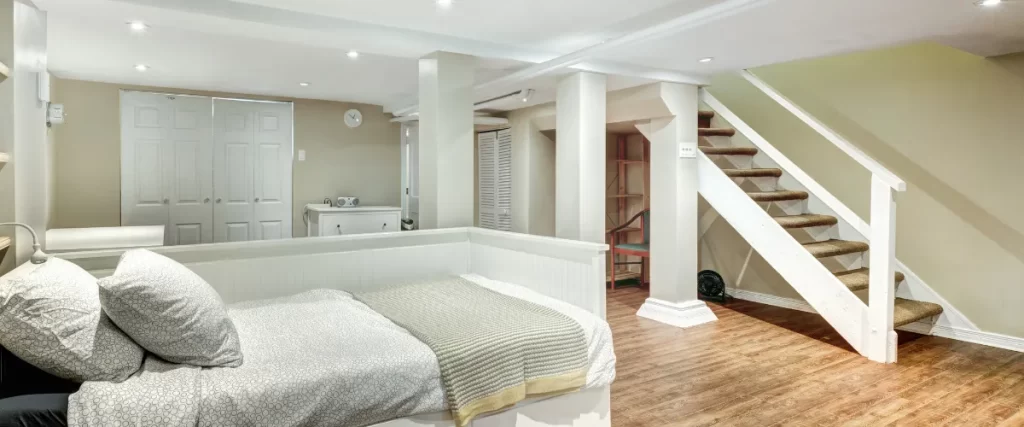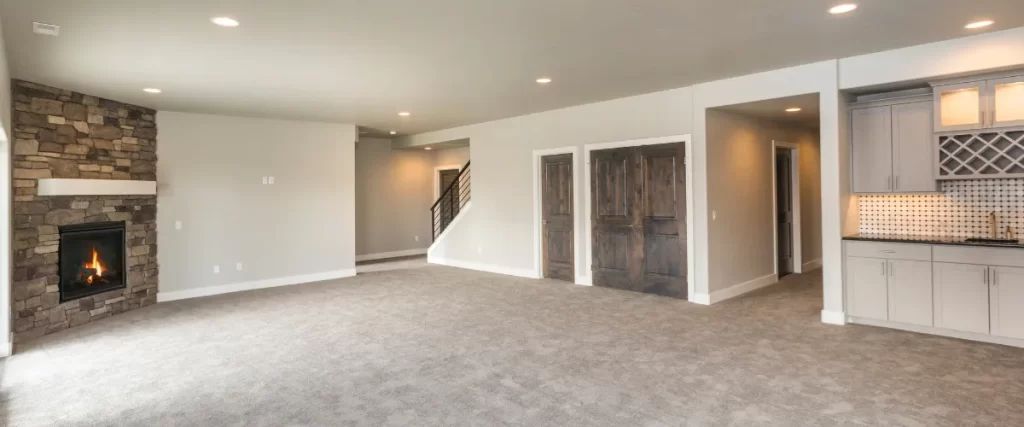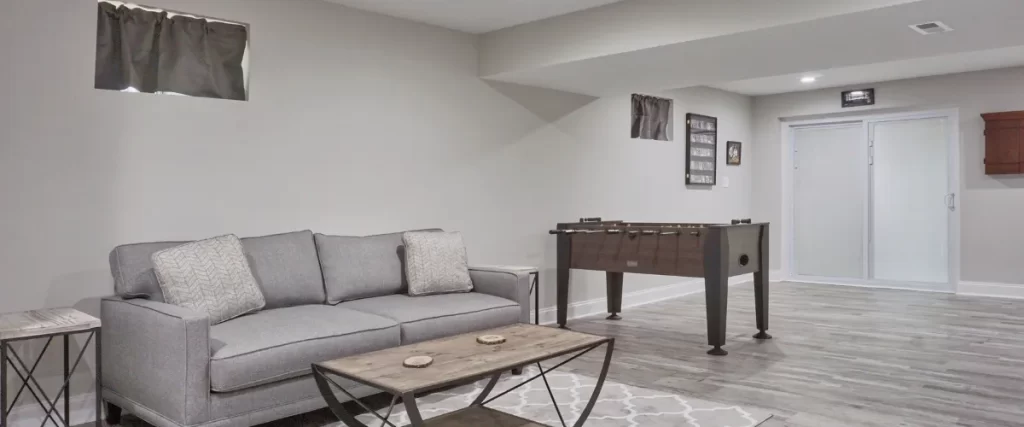So, you’re ready to finally finish that basement in your New Castle County home. Maybe you’re turning it into a guest suite, a home office, or that game room you’ve always wanted. But before the drywall goes up and the carpet is rolled out, there’s one invisible danger that too many homeowners overlook—radon gas.
It’s silent, odorless, and completely undetectable without testing. And unfortunately, Delaware—especially New Castle County—is no stranger to high radon levels. Remodeling a basement without addressing radon first can put your family’s health at risk and lead to costly remediation after the fact.
Let’s walk through everything you need to know about radon in Delaware basements before you start that remodel. Whether you’re just planning or already got the permits in hand, this guide will help you make smart, safe decisions from day one.

Why Radon Should Be on Your Radar in New Castle County
Radon isn’t just some far-off problem for homes built on rocky terrain or in the mountains. It’s a real concern here in Delaware—and New Castle County is one of the state’s hotspots.
Here’s why:
- Delaware’s coastal plain soil contains uranium and radium, which break down and release radon gas.
- Older homes in areas like Wilmington, Newark, and Bear often lack proper radon barriers or mitigation systems.
- Our humid, low-pressure climate can trap radon in basements, especially during winter when ventilation is limited.
According to the Delaware Division of Public Health, 1 in 3 homes tested in New Castle County have elevated radon levels above the EPA’s action level of 4.0 picocuries per liter (pCi/L). That’s higher than the national average.
Radon exposure over time can significantly increase your risk of lung cancer, especially for children, smokers, and the elderly.
What Exactly Is Radon?
Let’s break it down. Radon is a naturally occurring radioactive gas that forms when uranium in soil, rock, and water breaks down. It seeps up through the ground and enters your home through:
- Cracks in the foundation
- Gaps around pipes and drains
- Sump pits and crawlspaces
- Construction joints and basement walls
Because it’s heavier than air, radon collects in low-lying areas—like basements—making them the highest-risk areas in your house.
And no, opening a window once in a while doesn’t fix it. The only way to know your home’s radon levels is through proper testing.
When to Test for Radon in Delaware
If you live in New Castle County and are planning a basement remodel or addition, you should test for radon before you do anything else. Seriously—don’t wait.
Test if:
- You’ve never tested before
- Your home has a basement or crawlspace
- You’re finishing or remodeling any below-grade space
- It’s been more than two years since your last test
Radon levels can fluctuate seasonally, so the best time to test is during colder months (October through March) when your home is closed up.
You can order a free radon test kit from the Delaware Department of Health here:
👉 https://www.dhss.delaware.gov/dph/hsp/hhdradon.html
Or, you can hire a local radon professional for faster results and follow-up support.

What If Your Radon Levels Are High?
If your test comes back above the EPA’s recommended action level of 4.0 pCi/L, don’t panic—but don’t ignore it either. Radon mitigation is highly effective, and you’ve got a few solid options:
Radon Mitigation Systems:
- Sub-slab Depressurization (SSD): A vent pipe and fan pull radon from beneath the foundation and vent it outside.
- Crawlspace Ventilation: Uses mechanical fans or vent openings to reduce buildup under the home.
- Sealing Cracks and Joints: While not a standalone solution, sealing can reduce radon entry.
Most systems cost between $1,200–$2,500 in Delaware, depending on your home’s layout and foundation type.
If you’re remodeling, it’s the perfect time to install one. It’s easier (and cheaper) before walls and floors are finished.
Do You Need a Radon System Before Finishing a Basement?
Here’s the deal: It’s not legally required in Delaware to install a radon mitigation system before remodeling—but it is strongly recommended, especially if you’re doing any of the following:
- Adding bedrooms or living areas below grade
- Sealing floors or walls
- Installing insulation or vapor barriers
- Replacing flooring with tile or carpet (which can trap radon)
If you’re pulling a permit for your remodel, New Castle County inspectors might even ask whether you’ve considered radon mitigation as part of your project scope.
Installing a passive system now is a lot more cost-effective than retrofitting one later. And if your levels are already high? Don’t even think about finishing that space without mitigation.
How Delaware Compares to Other States for Radon Risk
You might be surprised to learn that Delaware is considered a Zone 2 state by the EPA, meaning moderate risk—but New Castle County, in particular, has multiple hot zones.
Here are a few local radon facts:
- Areas like Pike Creek, Hockessin, and Greenville have consistently tested higher than average.
- Homes built before 1980 rarely include radon-resistant construction features.
- Flood-prone homes near the Christina River or Red Clay Creek may also see higher radon entry due to foundation shifts and cracks.
Best Radon Mitigation System Manufacturers
Choosing the right radon mitigation equipment is just as important as installing it properly. These companies are trusted by professionals across Delaware and the U.S. for durable, effective systems.
Top Radon System Manufacturers and What Makes Them Stand Out
These manufacturers are known for reliable fans, monitoring devices, and accessories designed specifically for radon mitigation.
- RadonAway – Industry leader offering quiet, high-performance fans and system components trusted by pros nationwide.
- Fantech – Known for energy-efficient radon fans with durable motors and weather-resistant housing.
- Suncourt – Makes inline duct fans and pressure monitoring tools ideal for sub-slab systems.
- Tjernlund – Offers compact radon fans and ventilation systems that are great for tight crawlspaces.
- System Sensor – Produces radon alarm and monitoring devices that can be integrated into home safety systems.
FAQs – Radon in Delaware Basements
How often should I test for radon in my home?
At least every two years, or after any major remodeling project—especially in the basement.
Can I DIY a radon mitigation system?
If you’re handy, some systems are DIY-friendly, but professional installation ensures it meets EPA guidelines.
Is radon only a problem in old homes?
Nope. New homes can have high radon too—especially if built without radon-resistant features.
Does radon affect home value?
Yes. A known radon problem without mitigation can reduce resale value and deter buyers.
Are there health symptoms of radon exposure?
Unfortunately, no early symptoms. Long-term exposure increases the risk of lung cancer—especially in smokers.

Final Thoughts: Be Radon-Smart Before You Remodel
Remodeling your basement in New Castle County is an exciting project, but it’s also the perfect time to make sure your home is safe from hidden hazards like radon. Don’t let an invisible gas undermine all your hard work—and definitely don’t wait until after the remodel to address it.
Test first. Mitigate if necessary. And remodel with confidence knowing your basement is both beautiful and safe.
Need help figuring out your next steps? Contact us at (302) 437-5799, and we’ll walk you through radon-safe basement remodeling options that make sense for your home and your budget.
